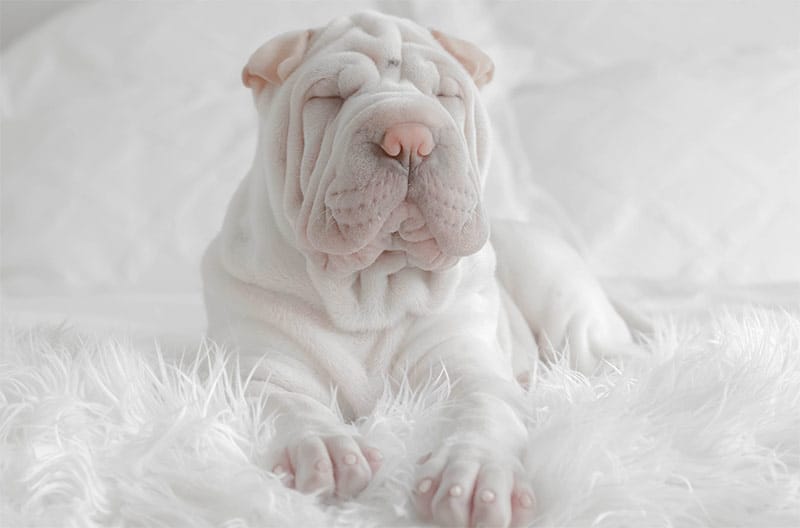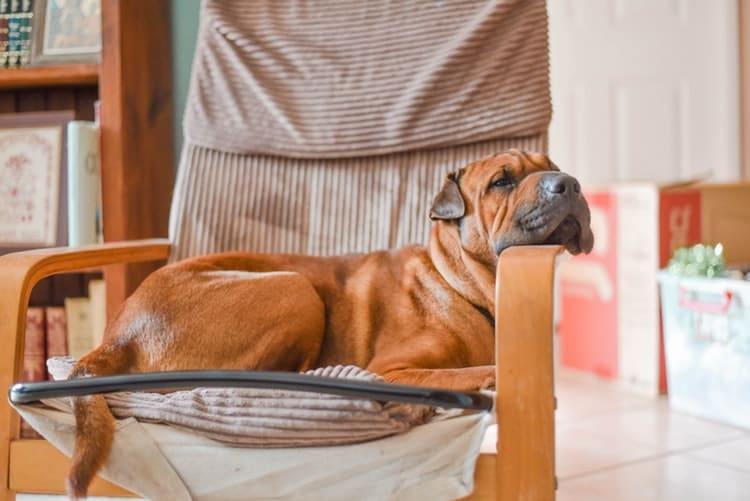Animal Health, Dog
Sleeping pills for dogs: our advice!
Is your dog having trouble sleeping? Is he restless at night? Then maybe you should consider giving him sleeping pills.
Dog parents who suffer from insomnia all ask themselves the same question: “ Can I give my dog sleeping pills? ”
Let’s get straight to the point to avoid any nonsense.
These types of powerful pharmaceuticals are not good for dogs. And animal poisoning with sleeping pills is still all too common.
Moreover, even for humans, sleeping pills should be handled with caution and only on medical advice.
The good news is that you can help your dog sleep better without harsh sleeping pills and in a completely natural way.
Here are our tips on sleeping pills and dogs with insomnia.
Can I give my dog sleeping pills?
Some dogs have a lot of trouble getting quality sleep and end up developing behavioral problems (agitation, aggression , stress, etc.).
This is especially true when you live in a noisy or unstable environment.
So what can you do to help your dog?
In this situation, pet owners often ask if they can give their dogs some of their sleeping pills so their companion can get a good night’s sleep.
No, you cannot give your dog sleeping pills, especially without a prescription.
In fact, classic human sleeping pills are dangerous for your dog’s health and can cause unwanted side effects such as:
- Poisoning
- Vomiting
- Coma that can lead to death
Sleeping pills are too risky for your pet! Do not self-medicate by giving your pills to your companion.
Some veterinarians may prescribe low doses of anti-anxiety medications such as Valium® or Xanax® for dogs with sleep problems, but this is rare. Furthermore, they are not the solution to treat the problem at the root.
Make no mistake about it; human medications (especially sleeping pills) are not necessarily suitable for a dog’s metabolism.
As an alternative to sleeping pills, there are safer ways to calm a dog and allow him to rest.
No to sleeping pills, yes to finding the cause of insomnia
Before anything else, it is important to know and understand the cause of your dog’s insomnia.
Insomnia in dogs can in fact be a symptom of many problems, physical and/or psychological.
It is therefore essential to observe it before acting in order to treat your insomnia, without sleeping pills, but above all in an appropriate manner.
1. Your dog lacks exercise
If you don’t give your dog the exercise he needs, he can develop many behavioral problems over the years.
One of them is nighttime restlessness. Dogs need to move around to burn off energy .
Imagine drinking coffee and then lying around the house all day without being able to exercise…
Also read: My dog is constantly walking around the house
2. Your dog suffers from anxiety
Phobias, separation anxiety , trauma, etc. Just like humans, dogs can suffer from anxiety for a variety of reasons.
And just like humans, this stress can affect the quality of their sleep. Is your dog restless at night and not sleeping much? Anxiety may be the reason.
3. Your dog needs to urinate
If you have a young puppy, he may not be able to sleep through the night because his bladder is too small to hold his urine for that long.
Generally, you can expect your puppy to be able to hold his urine for an hour longer for every month he gains.
For example, a three-month-old puppy can hold his urine for about four hours. The good news is that this won’t be a problem in the long run, because the older the puppy gets, the more likely he is to go through the night without getting up.
On the other hand, older dogs can also suffer from incontinence and this problem can also prevent them from sleeping.
Also read: My dog poops in the house at night
4. Your dog is suffering from pain or illness
Just like humans, dogs may have trouble sleeping if they are in physical pain from an injury or medical condition .
Older dogs with osteoarthritis, for example, may have difficulty getting comfortable at night due to painful inflammation of the joints.
Dogs with fleas may also have difficulty sleeping due to their need to scratch and general discomfort .
As a general rule, any pain or discomfort can prevent your partner from getting a good night’s sleep.
Also read: My dog cries at night
5. Your dog is disturbed by external elements
Sometimes a dog can’t sleep at night because something in his environment is bothering him, scaring him, stressing him out, or keeping him in a state of general alertness.
If your dog is otherwise healthy and suddenly has trouble sleeping, barking , or seems anxious or upset, take a look around your home, both inside and out, to see if your dog is reacting to anything.
This could be, for example, a rodent, a cat or any other animal nearby.
The source of insomnia may also be related to the position of your dog’s bed .
Perhaps, for example, it is too close to the road and your dog is disturbed by the noise of cars?
Once you determine the cause, you can find ways to minimize its impact on your dog’s sleep.
How do I treat my dog’s insomnia without sleeping pills?
Once you have identified the cause of your dog’s insomnia and eliminated the sleeping pill option, you can take action and adopt the right actions to help your dog get back to sleep, without pills or medications to make him sleep.
There are many natural solutions, here are the main ones.
1. Change where your dog sleeps
The first step is to rethink the placement of your dog’s bed.
Very young puppies, for example, feel better when they can hear and smell you.
In this case, move your puppy’s basket closer to your bed to improve the quality of his sleep. Distractions can also keep your pet awake.
Therefore, keep your dog’s basket away from windows, doors, passageways or noisy areas.
2. Get your dog more exercise
If you find that your dog is extremely active and your veterinarian has ruled out medical problems, try increasing his exercise level to two sessions: one in the morning and one in the evening.
Your dog should feel tired and will sleep better when he has used up all his energy.
If increasing your dog’s daily walks is difficult due to inclement weather, try to increase his exercise at home by involving him in some games such as hide-and-seek or fetch.
Teaching and practicing general obedience skills daily is also a great way to tire out your dog, especially if he is confined indoors.
Try teaching him one new trick a day or practice obedience exercises such as “sit . “
Organize short training sessions and spread them out throughout the day.
3. Give him CBD for dogs
CBD is an extract of the hemp plant. Calming, soothing and relaxing, it is perfect for helping your dog get quality sleep naturally and without any major side effects.
What makes CBD strong is its overall action.
If your dog suffers from separation anxiety or phobia, CBD will greatly reduce their stress and allow them to relax for a better night’s sleep.
Research has also proven that CBD reduces pain .
So if your dog can’t sleep because of an injury or illness, CBD will reduce the discomfort. And less pain means better sleep.
For further information: CBD & Sleep: How can CBD help my dog sleep better?
Botaneo is today considered the best CBD brand for dogs and cats .
Recommended by veterinarians, the range consists of natural plant-based sedatives, specially designed for our companions.
Discover CBD for dogs by going to the Botaneo online store >
4. Rule out the disease, treat it, or help your dog live better with it
If you suspect your dog has a medical or parasitic problem, schedule a visit with your veterinarian immediately to determine the cause.
Do not give him sleeping pills without a prescription and without a diagnosis.
If your dog is experiencing physical pain due to osteoarthritis or other joint problems, provide him with a comfortable bed.
Dogs with osteoarthritis may also find some relief through heat therapy, which involves applying warm compresses to their joints.
If your dog is in pain due to illness, try massaging him to help calm him down.
Do not give your dog painkillers designed for humans, as many of these are toxic, such as aspirin or ibuprofen .
There are medications for pain in dogs that your veterinarian can prescribe.
Monitor your dog closely and look for symptoms that may indicate he needs to see an emergency veterinarian, such as excessive panting and drooling , refusal to eat, extreme lethargy, inability to get up or a tendency to shy away from his legs.
If you suspect your dog has fleas, there are prescription medications available from your veterinarian or other herbal products for a less severe infestation.
Baths can also help soothe a dog’s itchy skin.
5. Help him relax
If your dog suffers from separation anxiety, place a blanket, old sweater or sweatshirt that smells like you in his bed.
Your scent should help him relax. You can also give him something to chew on, like a bone or a stuffed animal.
Many dogs will chew on their items until they are tired enough and fall asleep.
Also try massaging your dog to calm him down. Slow, gentle movements can relax a tense pet so he can sleep better at night.


